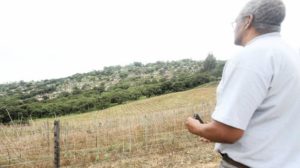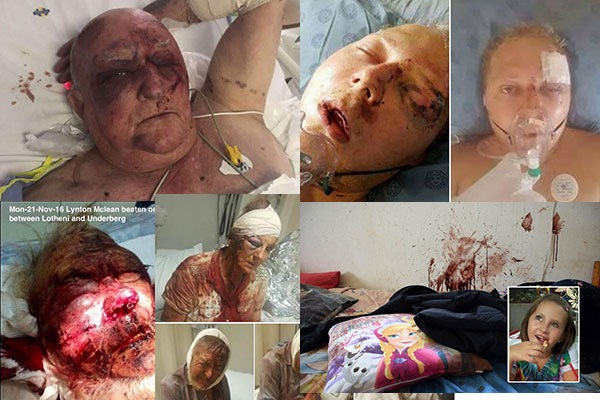THE POST / 16 NOVEMBER 2017, 1:11PM / CHARLENE SOMDUTH

The chairman of Farmers’ Watch, Raj Govender, points to his farm. RIGHT: A graph from police shows the number of attacks on farmers.
Durban – Physical attacks and land grabs have farmers worried about their safety and their future.
The situation has become so bad that affected communities north of Durban recently revived the Farmers’ Watch group.
Its chairman, Raj Govender, said attacks had been reported in areas such as Inanda, Tea Estate, Hazelmere, Redcliffe and New Glasgow.
“Apart from robberies, farmers are also fighting for their land as land grabs are on the rise,” said Govender.
“The communities of Hazelmere and Redcliffe have come under attack, with farmers being robbed daily, while crops are being destroyed in Inanda by land grabs. We are relying on the police to assist us.”
The organisation, which has 100 members, meets once a month to discuss their concerns.
“We have a WhatsApp group to alert each other of robberies and land grab issues.”
Govender said the current situation had a knock-on effect on the country’s economy.
“Farmers provide produce and create jobs. If they close their farms, what will the future hold for our country? Our safety needs to be taken seriously and the police need to be more proactive in responding to our calls.”
Yaga Govender, deputy president of the Natal Cane Growers’ Association and chairman of the Tea Estate Farmers’ Organisation, said land invasions were a huge problem in Tea Estate-Inanda.
“There are about 50 Indian small-scale farmers who are affected by the land invasion. These sugar cane and vegetable farmers have title deeds to about 10 hectares of land each and they pay rates to the municipality, but since 2015 they have been targeted for their land.”
Yaga said in the same area there were white commercial farmers with 1000 hectares of land but they remained untouched.
“The small-scale farmers are vulnerable and despite their pleas to the local authorities for help, nothing has been done to help them. Some farmers have moved out of the area, while others have stopped farming. If this goes on, at least 1000 people will be left unemployed.”
He said the farmers were living from hand to mouth and unable to afford private security to protect them or guard their land from invasion.
The president of Agri SA, Dan Kriek, said it was vital the farming community become proactive in the fight against crime.
Lorraine Claasen, a criminologist at AfriForum, said 365 farmers had been attacked in South Africa to date, with 74 of them murdered.
Last year, the figure stood at 339 attacks and 64 murders.
But the latest figure, she said, could be higher because many crimes were not reported to the police.
Last month, Police Minister Fikile Mbalula reportedly said they had working groups on beefing up security and that farmers should ensure they were compliant with the country’s laws and also desist from hiring undocumented foreigners.
Police spokesperson Lieutenant-Colonel Thulani Zwane said the number of farm attacks in the province and country was worrying.
“Within the SAPS, we have designated units to tackle crime that affects farming communities. If farmers are not getting help from their various stations, they need to meet their station commander to raise their concerns and issues.”
Zwane said farmers needed to invite the police to community crime prevention meetings.
“The only way to combat this type of criminal activity is by working together.”
https://www.iol.co.za/thepost/small-farms-under-attack-12033883

